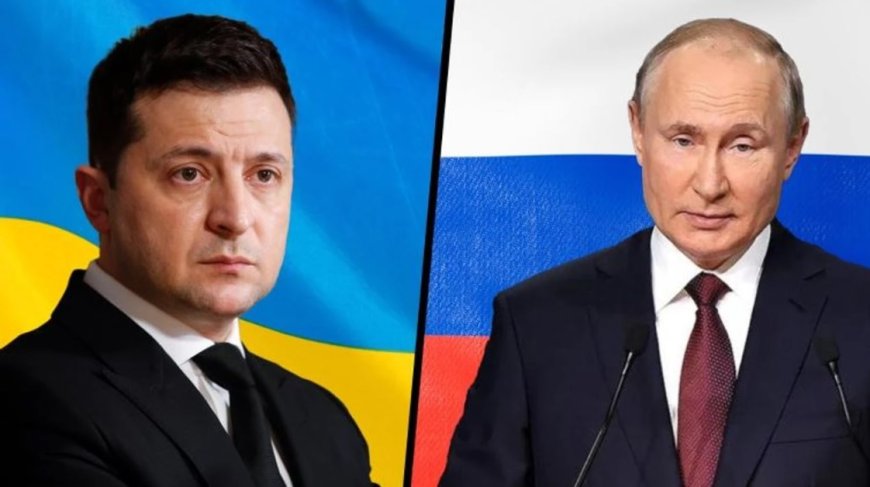A Strategic, Academic, and Political Analysis of Russia’s Invasion of Ukraine
Russia's invasion of Ukraine has led to significant military, economic, and geopolitical losses for Moscow, reshaping global power dynamics. This in-depth analysis explores Russia’s strategic failures, NATO’s resurgence, economic sanctions, diplomatic isolation, and the potential role of Turkey as a peace mediator.


Yusuf Inan / Yerel Gündem / Turkey - Ukraine
Russia’s Invasion of Ukraine: Losses and Global Impact
A Strategic, Academic, and Political Analysis of Russia’s Invasion of Ukraine
Russia’s full-scale invasion of Ukraine in 2022 marked one of the most disruptive geopolitical events in modern European history. This conflict has inflicted severe military, economic, diplomatic, and strategic losses on Moscow while reshaping global power dynamics. This in-depth analysis examines the historical context, strategic miscalculations, military consequences, economic repercussions, diplomatic isolation, and the future geopolitical implications of Russia’s war in Ukraine.
Historical Context: Russia's Longstanding Goal of Access to Warm Waters
For centuries, Russia has pursued the strategic objective of securing unrestricted access to warm-water ports and global trade routes. The annexation of Crimea in 1783 under Catherine the Great was the first significant step toward controlling the Black Sea. Throughout the 19th and 20th centuries, Russia repeatedly sought dominance over the region, often clashing with the Ottoman Empire and other European powers.
During the Soviet era, Moscow solidified its grip over the Black Sea, but the dissolution of the USSR in 1991 left Russia with a weakened position. The expansion of NATO into Eastern Europe and the aspirations of Georgia and Ukraine to join Western institutions further complicated Moscow’s regional ambitions. By the early 2000s, Russia's presence in the Black Sea was dwindling, with Bulgaria and Romania joining NATO and Ukraine maintaining control over Crimea.
Russia's strategy shifted towards leveraging energy diplomacy and hybrid warfare to maintain influence. However, Ukraine's 2014 Euromaidan Revolution, which ousted a pro-Russian government, disrupted Moscow's plans. Russia responded with the annexation of Crimea and support for separatist movements in Donetsk and Luhansk, setting the stage for the full-scale invasion in 2022.
Strategic Miscalculations and Geopolitical Consequences
While the Kremlin initially viewed the invasion as a swift military operation to install a pro-Russian government in Kyiv, its strategic miscalculations led to a prolonged conflict. Russia underestimated:
-
Ukraine's resistance: Ukrainian forces, supported by Western intelligence and weaponry, mounted an effective defense, preventing the rapid collapse of the government.
-
NATO and Western unity: Instead of deterring NATO, the invasion accelerated the alliance's expansion, leading to Finland and Sweden joining the bloc.
-
Economic backlash: Severe Western sanctions have crippled Russia’s access to global financial markets, technology, and energy exports.
Russia’s attempt to create a buffer zone in Ukraine has backfired, reinforcing Western security structures and pushing former Soviet republics further away from Moscow's sphere of influence.
Military and Intelligence Failures
Russia's military campaign has exposed critical weaknesses in its armed forces and intelligence apparatus:
-
Casualties and equipment losses: U.S. intelligence estimates suggest that Russia has suffered nearly 300,000 military casualties, including over 120,000 fatalities. Thousands of tanks, armored vehicles, and aircraft have been lost.
-
Incompetent logistics and strategy: Initial Russian offensives suffered from supply chain failures, poor coordination, and underestimation of Ukrainian resilience.
-
Decline of Russian intelligence credibility: Russian security agencies, particularly the FSB, provided overly optimistic assessments of Ukraine’s stability. As a result, Russian forces entered the war with flawed strategic assumptions, leading to major battlefield setbacks.
The Russian military, once feared as a global force, has been significantly degraded, while Ukraine has emerged as a modernized, well-equipped fighting power with strong Western backing.
Economic Consequences: Sanctions and Energy Realignment
Western sanctions have severely impacted Russia’s economy by:
-
Freezing over $300 billion in Russian central bank reserves.
-
Cutting Russian banks from the SWIFT financial system.
-
Restricting access to critical technologies, crippling military production.
-
Forcing Russia to sell oil at discounted prices to China and India.
The European Union’s rapid transition away from Russian gas has further weakened Moscow’s economic leverage. In 2021, Russia supplied 45% of Europe’s natural gas; by 2024, this share dropped below 18%.
Major multinational corporations have exited Russia, and capital flight has led to a brain drain, as skilled professionals leave the country in search of stability.
Diplomatic Isolation and Loss of Global Influence
The invasion has isolated Russia diplomatically:
-
United Nations condemnation: A UN General Assembly vote saw 141 nations condemning Russia’s actions.
-
Expulsions from international organizations: Russia was removed from the Council of Europe and saw its G8 membership permanently revoked.
-
Erosion of influence in post-Soviet states: Kazakhstan, Armenia, and Georgia have distanced themselves from Moscow, seeking alternative security and economic partners.
Even traditional Russian allies have been cautious in their support. China has provided economic relief but has refrained from military aid, while India continues its strategic balancing between Russia and the West.
NATO and Western Defense Revitalization
Russia’s invasion has reinvigorated NATO:
-
Increased defense spending: Germany announced a historic $100 billion military investment, while Poland has increased its defense budget to 4% of GDP.
-
Strengthening of Eastern Europe: NATO has reinforced its eastern flank, deploying additional forces to Poland, Romania, and the Baltic states.
-
Finland and Sweden joining NATO: Russia’s border with NATO has expanded by over 1,300 kilometers, counteracting Moscow's original objective of halting NATO enlargement.
Moscow’s war has, paradoxically, strengthened the Western alliance instead of weakening it.
Turkey’s Role as a Mediator and Potential Peace Force
Turkey has played a crucial diplomatic role in managing the crisis:
-
Facilitating peace talks: Turkey hosted early negotiations between Russian and Ukrainian officials, although these efforts stalled.
-
The Black Sea Grain Initiative: Turkey and the UN brokered a deal allowing Ukrainian grain exports, mitigating global food insecurity.
-
Maintaining dialogue with both sides: Ankara has supplied Ukraine with military aid while keeping economic and political channels open with Moscow.
Turkey’s unique position as a NATO member with strong ties to Russia makes it a key player in future peace negotiations. A potential Turkish-led peacekeeping mission in Ukraine could offer a strategic exit for Russia while ensuring stability.
Future Scenarios: The Path to Peace or Prolonged Conflict
The future of the conflict hinges on several factors:
-
Prolonged stalemate: A drawn-out war with entrenched front lines could lead to a frozen conflict akin to the Korean Peninsula.
-
Negotiated settlement: A diplomatic resolution may involve Russia relinquishing occupied territories in exchange for security guarantees.
-
Russian internal instability: Prolonged military failures and economic hardships could lead to political upheaval within Russia, potentially reshaping its leadership.
The West’s continued support for Ukraine will be crucial in shaping the war's outcome. However, Russia may ultimately recognize that peace is in its best strategic interest.
Conclusion: Russia Needs Peace More Than Ukraine
The greatest irony of Russia’s war in Ukraine is that, despite its ambitions, Moscow has only weakened itself. The war has eroded Russia’s military strength, diminished its economic stability, and undermined its diplomatic standing.
While Ukraine will continue to endure immense challenges, it has emerged more united, resilient, and integrated into the Western security framework. The longer the war drags on, the greater Russia’s losses will be.
A strategic shift toward diplomacy, facilitated by actors like Turkey, remains Russia’s best option to salvage its position in global affairs. Otherwise, history may record this war as the beginning of Russia’s irreversible decline.

YUSUF İNAN / PEACE AT HOME, PEACE IN THE WORLD (*)
Twitter : @Yusufinan2023
Instagram : yusufinan2023
Instagram : fondinan2016
Email : [email protected]
Website : www.yerelgundem.com
(*) As Mustafa Kemal Atatürk, the founder of modern Turkey, once said, 'Peace at Home, Peace in the World.' This timeless principle serves as a guiding light for nations striving for harmony, coexistence, and global stability.





















